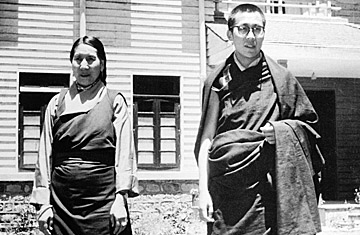
May 28, 1959: Tenzin Gyatso, the 14th Dalai Lama, and his mother, shortly after the Tibetan Buddhist ruler fled his homeland for exile in northern India
(See Cover)
Night had settled upon the roof of the world. With a jingling of harness and the clipclop of hooves, a small caravan wound slowly up the 17,000-ft. pass. Ahead lay the snowy summits of the Himalayas, an ocean of wind-whipped peaks and ranges that have served Tibet as a rampart since time began. Cavalrymen with slung rifles spurred forward; state officials in furs, wearing the dangling turquoise earrings of their rank, sat tiredly in the saddle; rangy muleteers in peaked caps with big earlaps goaded the baggage train up the steep path. As they passed a cairn of rocks topped by brightly colored flags printed with Buddhist prayers, each pious Tibetan added a stone to the mound, murmured the traditional litany: "So-ya-la-so."
They listened tensely for the sound of gunfire behind them, which would mean that the pursuing Red Chinese had clashed with the rearguard of Khamba tribesmen. Up front, scouts probed carefully to make sure Communist paratroops had not been dropped in the pass to bar their way. All of them—the 35 Khambas of the rearguard, the 75 officials, soldiers and muleteers—were charged with a solemn responsibility: to make good the escape from Tibet of the God-King in their midst—the 23-year-old 14th Dalai Lama.
Journey to Safety. As the Dalai Lama and his escort fled by night and hid by day in lamaseries, villages and Khamba encampments, the furious Red Chinese boasted that they had put down the three-day revolt in Lhasa that had served to cover the God-King's escape. Point-blank artillery fire drove diehard lamas from the Norbulingka, summer palace on the city's outskirts. Red infantrymen surged into the vast warrens of the Potala winter palace, rounded up defiant monks in narrow passages and dark rooms where flickering butter lamps made Tibet's grotesque gods and demons seem to caper on the walls. The corpses of hundreds of slain Lhasans lay in the streets and parks of the city, from the gutted medical college on Chakpori hill to the barricaded main avenue of Barkhor. Rifle fire and the hammer of machine guns rattled the windows of the Indian consulate general, whose single radio transmitter is the only communication link with the free world. And Red Chinese columns and planes crisscrossed the barren plateaus and narrow valleys of Tibet in search of the missing Dalai Lama.
Last week word came that the Dalai Lama had reached safety in the village of Towang, just across the Indian border. His two-week march to the frontier, it was said, had been screened from Red planes by mist and low clouds conjured up by the prayers of Buddhist holy men.
